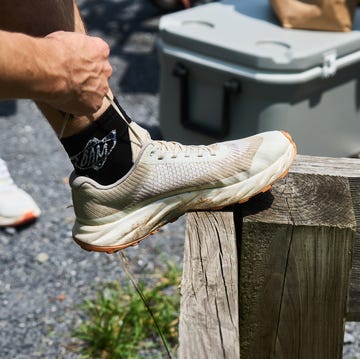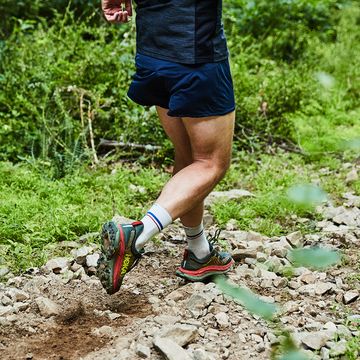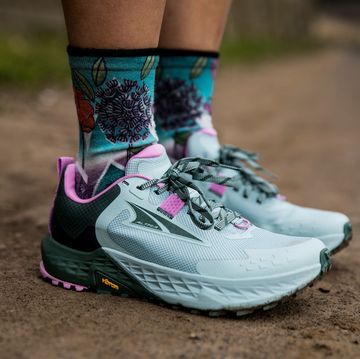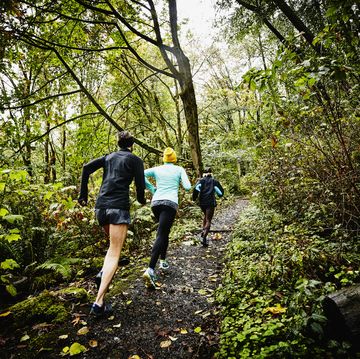It’s unlikely that any of us will host a sequel to “The Decision” on ESPN to announce our Pearl Izumi, La Sportiva or Tecnica signing, but for trail runners, sponsorships and opportunities to join a team are readily available. Most makers of trail running shoes sponsor mountain, ultra and trail runners and with a little initiative, runners can join these teams.
Joining a team can provide a runner with free or discounted gear, race comps and money to travel to races. With few trail and ultra races paying significant prize money, travel funds, sometimes stretching into the thousands, are huge to a racer’s budget. Although sponsorship dollars can vary greatly and exact amounts awarded to specific athletes can be a bit hush-hush, runners representing a brand should be adequately compensated for their efforts.
Being on a team also means racing for more than oneself. Representing a brand and racing with teammates can push athletes to achieve greater feats. In describing his sponsorship, Boulder’s Tim Long says, “McDavid has the foresight to see that I’m committed to them and really believe in the clothing. Sometimes I can be unmotivated to get out every day to train, but I actually have something to motivate me to train and race much harder this year — a company that believes in me.”
Race
All teams want runners who will be on the podium, finishing at the front of the race or at the top of their age group. These runners will of course have greater opportunities to earn sponsorships, but the well-known, consistent middle-of-the-packer can find a spot as well. Tecnica wants to “create a balance of high-level athletes to the mildly competitive,” says team manager Katie Gould. Similarly, in addition to elite runners, La Sportiva includes several individuals who are coaches, race directors and leaders of group runs.
Frequent racing obviously increases visibility. While La Sportiva doesn’t require a minimum number of races, team member Bernie Boettcher races nearly 50 times each year, always in his bright yellow singlet. If the singlet comes off post-race, sponsored runners are careful to again put on sponsor gear for any post-race pictures or awards ceremonies. Each company will have different race requirements, but runners have to expect to race to gain a spot on a team — this is the easiest way to promote the brand at competitive events.
Socialize
Brands want runners who will stay after the race, talk to other runners and be an ambassador for their products. This personal testimonial is powerful advertising for a brand, at a rate much cheaper than more conventional advertising. When effective, a team can become the face of that brand in the trail running community; Pearl Izumi frequently uses their athletes in ads. In the case of Tecnica, new to the market and with shoes built on over-sized TRS (Tecnica Rolling System) technology, seeing other runners have success in these shoes will be especially meaningful. Runners love to talk about running and, with a company’s message snuck in, the sponsorship gains value.
Larger communities often have organized groups of trail runners and being active in such a group will improve your marketability. Though not limited to trails, Inov-8 runners James Johnson and Kevin Tilton are active in the Central Mass Striders. Pearl Izumi’s Nick Clark is hosting a Fat Ass 50K starting from his house this month. Runners active in groups like these have reach that’s valuable to brands. Talk to your local running store for information on local trail running groups or do a quick Google search.
Blog
Blogging can bring a sponsor’s message to a greater audience than racing alone. Scott Dunlap of the Inov-8 team has blogged for some time and now has perhaps the most page views of any trail runner. In addition to race reports and trail running news, Dunlap has used his blog to do product reviews and highlight products that he likes. Recognizing the power of his personal endorsement, the makers of these products become a sponsor. “We’re just formalizing an ambassador role I was already comfortable doing,” Dunlap says.
According to Dunlap, a good running blog can pull in 5,000 to 10,000 unique visitors per month (typically about 10,000 to 20,000 page views per month). With targeted Internet advertising costing roughly $20 per CPM ($20 to reach 1,000 people), even a small blog can generate $200 ($20 x 10) in value for a brand per month. Again, this advertising is also more meaningful with a personal testimonial tied to it. Dunlap provides tips on increasing blog page views here.
What else?
In addition to providing publicity for the brand, Pearl Izumi’s team tests product developments and provides feedback directly to the designers in Louisville, Colo. Tecnica runners will do the same. Perhaps one has a unique skill in addition to running that makes them valuable to a sponsor; for example, although Tim Long claimed a few course records in 2010, he knows that there are faster runners around. In addition to the PR generated through his aggressive race schedule, he’ll compliment this by providing McDavid with some Web editing work. Actions such as this further integrate a runner within the brand and make the sponsorship even more of a win-win for both parties.
Ask
All of these areas should be addressed in a running resume: Race, be active in your trail running community, share what products you like in a blog and get creative with what you can do to bring value to a potential sponsor. Ultimately, don’t be afraid to ask.
For more information, check out the following:
-Runners interested in joining what will be the first Tecnica trail running team can contact them here.
-The 5 Best Hiking Shoes for 2024 blog.
-Pearl Izumi has already selected the 2011 team, but won’t turn away a valuable applicant during the year. Runners can submit Running in the Cold.
More team blogs and sites:
-Salomon Running
-Inov-8
-Montrail
-Health - Injuries
-New Balance
-Vasque
Justin Mock lives and trains in Denver, Colo. He also works as a CPA and has run 2:29 for the marathon.












